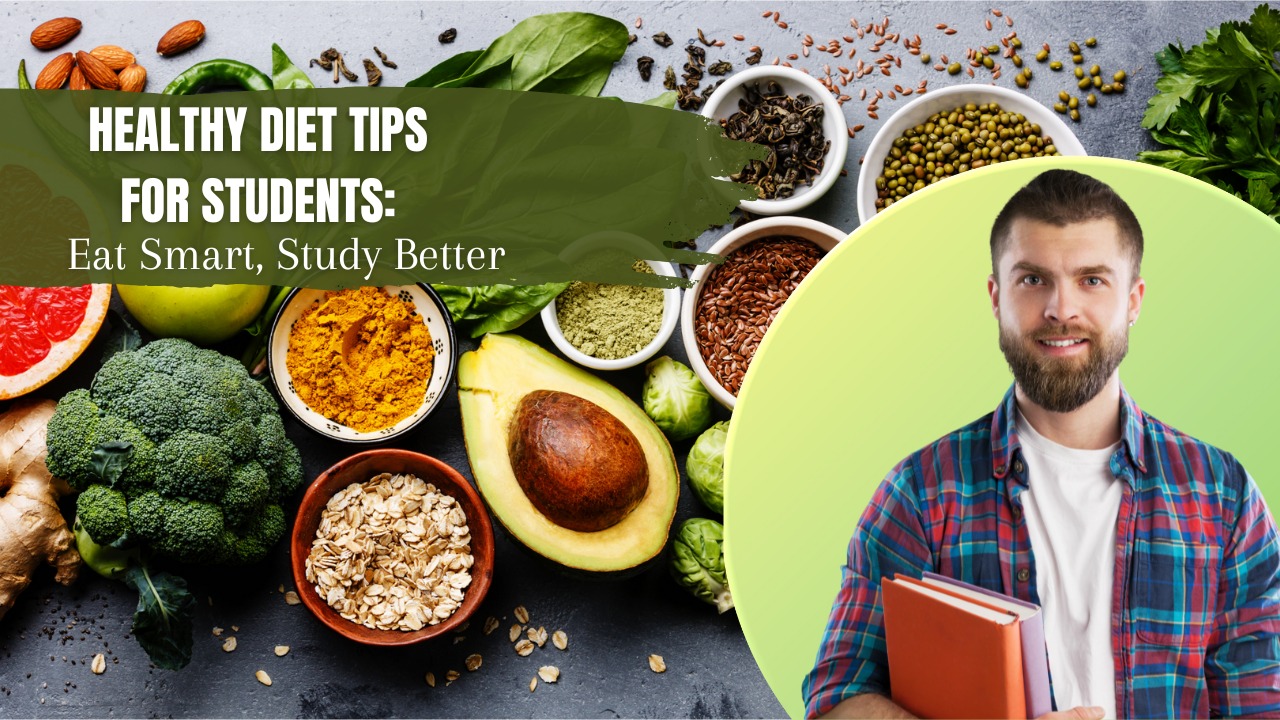In the fast-paced life of students, where classes, homework, social events, and part-time jobs compete for attention, one important thing often gets overlooked — a healthy diet. Many students tend to skip meals, grab fast food, or rely on snacks, not realizing how much their eating habits affect their academic performance and overall health.
A proper diet plays a key role in brain function, memory, focus, and energy levels. Eating well helps students stay alert during lectures, concentrate better while studying, and feel more energized throughout the day. Following healthy diet tips for students—like eating regular meals, staying hydrated, and including fruits, vegetables, and whole grains—can make a big difference in both mental and physical performance.
Good nutrition also strengthens the immune system, which helps students avoid frequent illnesses that could interrupt their studies. By making healthier food choices, even in small ways, students can improve their well-being and achieve better academic results over time.
Why Diet Matters for Students

A. Cognitive Function and Focus
Eating a healthy diet plays an important role in supporting brain health and improving focus. Nutrients like omega-3 fatty acids, antioxidants, and complex carbohydrates help boost memory, sharpen attention, and improve thinking skills. For students, this means better performance during lectures, exams, and study sessions. One of the most effective healthy diet tips for students is to include foods like fish, nuts, berries, and whole grains in daily meals to support better brain function.
B. Energy and Mood Stabilization
While sugary or processed snacks may offer a quick burst of energy, they often lead to crashes that make students feel tired or irritable. A more effective approach is to eat balanced meals that include protein, healthy fats, and whole grains. These foods provide long-lasting energy and help maintain a stable mood throughout the day. Among the most helpful healthy diet tips for students is planning meals that offer steady energy rather than quick fixes.
C. Immune System Strength
A weak immune system can lead to frequent illnesses, especially during stressful times like exams. Poor eating habits reduce the body’s ability to fight off infections. On the other hand, eating a diet rich in vitamins, minerals, and antioxidants strengthens the immune system. One of the most practical healthy diet tips for students is to regularly consume fruits, vegetables, and nutrient-rich foods to support overall health and reduce the risk of getting sick.
Key Nutrients Students Need
A. Complex Carbohydrates
Why? Provide long-lasting energy and improve brain function
Complex carbs give steady energy and help avoid sudden crashes.
They support brain function by offering a constant fuel source.
Help improve memory, focus, and mental performance.
Keep blood sugar levels stable, which supports mood and energy.
Easy to include in daily meals for better study performance.
Sources:
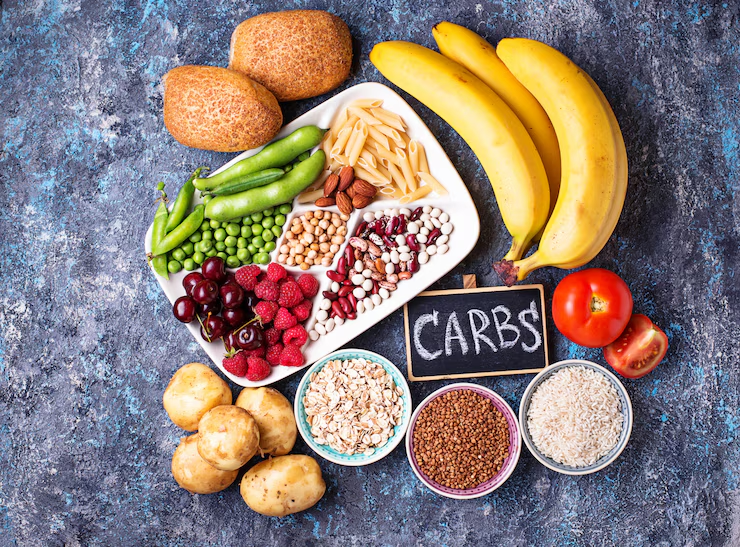
Whole grains (brown rice, oats, whole-wheat bread)
Sweet potatoes
Legumes (lentils, chickpeas, beans)
Healthy diet tips for students:
Start your day with oatmeal or whole-grain toast.
Swap white rice or pasta for brown rice or whole-grain options.
Add lentils or beans to soups, salads, or rice bowls.
B. Protein
Why? Essential for muscle repair, immune function, and sustained energy
Helps rebuild muscles after physical activity.
Supports a strong immune system.
Keeps you full longer and provides lasting energy.
Aids in staying active and focused throughout the day.
Sources:
Eggs
Lean meats (chicken, turkey)
Beans
Tofu
Greek yogurt
Nuts
Healthy diet tips for students:
Add eggs or Greek yogurt to breakfast.
Include lean meats or tofu in lunch or dinner.
Snack on nuts or roasted beans for protein on the go.
C. Healthy Fats
Why? Supports brain health and hormone production
Boosts memory and concentration.
Helps with mood balance and focus.
Needed for hormone and cell production.
Keeps brain and body functioning properly.
Sources:
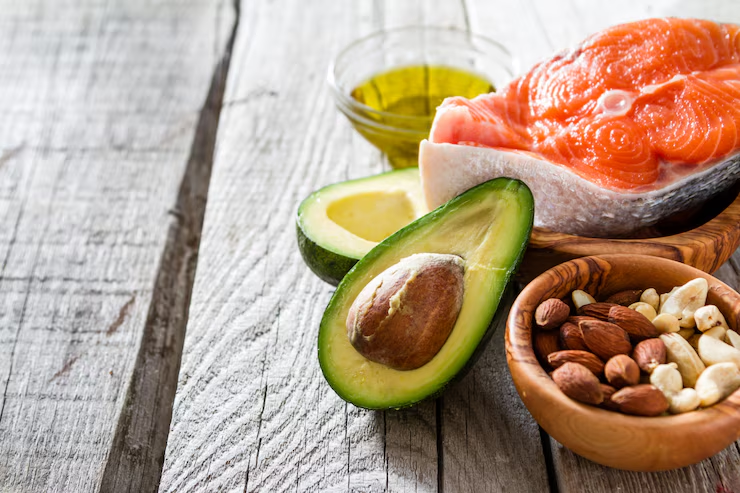
Avocados
Olive oil
Nuts
Seeds
Fatty fish (like salmon, mackerel)
Healthy diet tips for students:
Add avocado to toast or salads.
Use olive oil for cooking or dressing.
Snack on nuts and seeds between meals.
Eat fatty fish at least once a week.
D. Fiber
Why? Aids digestion and keeps you full longer
Supports healthy digestion and regular bowel movements.
Helps control hunger and prevents overeating.
Keeps energy levels stable throughout the day.
Important for gut health and overall wellness.
Sources:
Fruits
Vegetables
Whole grains
Legumes (beans, lentils, chickpeas)
Healthy diet tips for students:
Include fruits and veggies in every meal.
Choose whole-grain bread, pasta, or rice.
Add beans or lentils to soups, salads, or wraps.
Snack on raw veggies or fruit during study breaks.
E. Vitamins and Minerals
Iron: Helps in oxygen transportation and energy production.
Calcium & Vitamin D: Vital for bone health.
Vitamin C & E: Powerful antioxidants.
Building a Balanced Plate
A well-balanced meal is key to maintaining energy levels and supporting overall health. It should include all three macronutrients: carbohydrates for energy, protein for muscle repair, and healthy fats for brain function. Including a variety of vitamins and minerals is also important for immune health and digestion.
Healthy diet tips for students include eating meals that combine these nutrients to keep energy steady throughout the day. For example, a meal with whole grains, lean protein, and healthy fats from avocados or nuts will help students stay focused, energized, and healthy, supporting both academic and physical performance.
Sample Plate Composition:
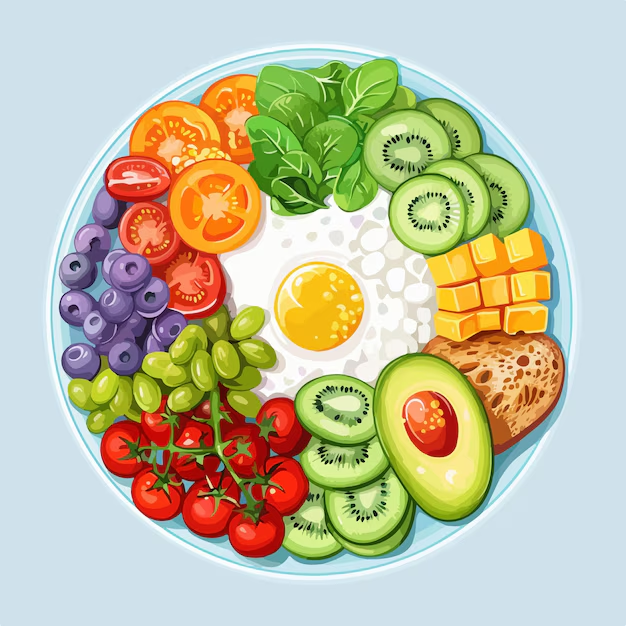
50% vegetables and fruits
25% whole grains
25% lean protein
Add healthy fat (e.g., olive oil or avocado)
Include water or herbal tea as a beverage
Smart Grocery Shopping Tips for Students
Make a List Beforehand
Avoid impulse buys by planning meals and snacks for the week.
Buy in Bulk When Possible
Staples like rice, oats, and frozen vegetables are cheaper in larger quantities.
Shop the Perimeter of the Store
That’s where fresh produce, dairy, and meats are usually found.
Look for Discounts and Store Brands
Generic brands often offer the same quality for less.
Never Shop When Hungry
You’re more likely to make unhealthy choices when you’re craving food.
Meal Prep: A Game-Changer for Busy Students
Benefits:
Meal prepping offers several benefits for students with busy schedules. It helps save time during hectic weeks, making it easier to stick to nutritious meals without scrambling. It also reduces food waste by ensuring ingredients are used efficiently. Additionally, meal prepping prevents unhealthy snacking or frequent takeout, which can often be less nutritious and more expensive.
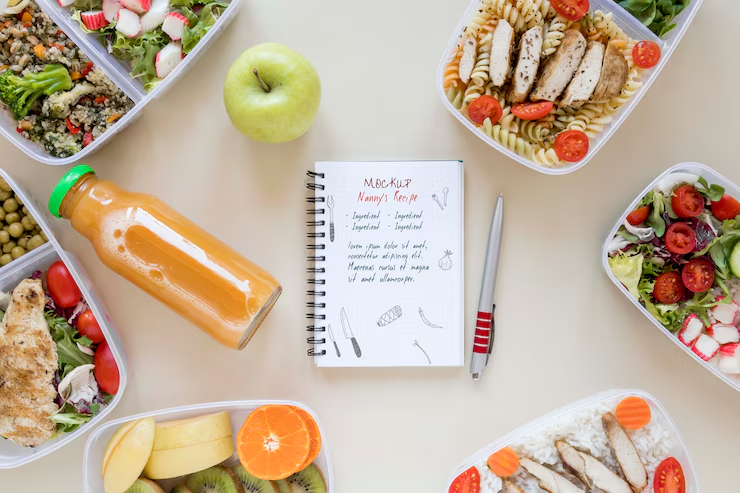
Basic Meal Prep Strategy:
Start by selecting a prep day, such as Sunday, to plan your meals for the week. Cook in bulk, preparing grains, proteins, and vegetables that can be used in multiple meals. Focus on versatile ingredients like grilled chicken, rice, and roasted vegetables that can be combined in different ways. Store these prepared meals in labeled containers, making it easy to grab a healthy option when you’re in a rush. These healthy diet tips for students will help maintain balanced eating habits even on the busiest days.
Quick and Healthy Meal Ideas
Breakfast:
Overnight oats with chia seeds and berries: A quick, fiber-rich breakfast with healthy fats and antioxidants.
Scrambled eggs with whole wheat toast and avocado: A filling meal with protein, fiber, and healthy fats.
Greek yogurt with granola and banana: A protein-packed breakfast with natural sweetness and fiber.
Lunch:
Quinoa salad with chickpeas, cucumber, tomatoes, and lemon dressing: A nutrient-packed salad with protein and fresh veggies.
Turkey and spinach wrap with hummus: A protein and fiber-rich wrap for a satisfying lunch.
Brown rice with stir-fried tofu and mixed vegetables: A plant-based, balanced meal full of protein and nutrients.
Dinner:
Grilled salmon with sweet potato and steamed broccoli: A healthy dinner with omega-3s, fiber, and vitamins.
Pasta with tomato-basil sauce, spinach, and grilled chicken: A hearty, protein-rich meal with whole grains and veggies.

Lentil curry with brown rice: A filling, plant-based meal with fiber and protein.
Snacks:
Almonds, walnuts, or trail mix: A healthy, satisfying snack with healthy fats and protein.
Apple slices with peanut butter: A sweet and salty snack with protein and fiber.
Carrot sticks and hummus: A crunchy, nutrient-rich snack with healthy fats.
Hard-boiled eggs: A protein-packed snack for quick energy.
Hydration: The Forgotten Key
Why Water Matters:
Improves concentration and cognitive function: Staying hydrated helps improve focus and mental clarity, making it easier to concentrate during long study sessions. Proper hydration supports brain function, enhancing memory and problem-solving skills.
Helps regulate body temperature and digestion: Water helps maintain the body’s temperature and supports digestion by breaking down food, preventing bloating and constipation. Proper hydration is essential for overall bodily functions.
Reduces fatigue and headaches: Dehydration can lead to tiredness and headaches, which can hinder your productivity and energy levels. Drinking enough water helps keep your energy up and reduce the chances of these issues.
Hydration Tips:
Carry a reusable water bottle: Keep a water bottle with you throughout the day to remind yourself to drink regularly, especially during busy school hours. This is a simple and effective healthy diet tip for students.
Flavor water with lemon, cucumber, or mint: If plain water feels boring, add some lemon, cucumber, or mint for a refreshing twist that makes staying hydrated more enjoyable.
Avoid sugary sodas and excessive caffeine: Sugary drinks and too much caffeine can dehydrate the body, leading to more fatigue and potential health issues. Opt for water to stay hydrated and energized naturally.
Healthy Eating Habits and Mindset
A. Eat Mindfully
Taking time to truly enjoy your food can improve digestion and help you recognize when you’re full. Avoid eating in front of a screen, as distractions can lead to overeating. By chewing slowly and savoring each bite, you can become more aware of your body’s hunger and fullness cues. This is an important healthy diet tip for students that encourages better eating habits and supports overall well-being.
B. Don’t Skip Meals
Skipping meals may seem like a time-saver, but it can actually lead to overeating later and negatively affect your concentration. When you don’t eat regularly, your energy levels dip, making it harder to focus on studies. Keeping a consistent meal schedule will help maintain steady energy and improve cognitive function. This is one of the best healthy diet tips for students to keep you alert and energized throughout the day.
C. Practice Portion Control
Understanding the difference between hunger and boredom is essential for maintaining a healthy relationship with food. Eat until you’re satisfied, not stuffed. Practicing portion control helps prevent overeating and keeps you from feeling sluggish. Listening to your body’s signals and stopping when full can help you maintain a balanced diet and avoid excess calories. This tip is a simple but effective healthy diet tip for students.
D. Be Kind to Yourself
It’s important to remember that perfection isn’t necessary for a healthy diet. Don’t stress over indulging in an occasional treat or missing a meal. What matters most is balance and consistency. If you have an off day, don’t be hard on yourself—focus on making better choices moving forward. Practicing self-compassion is a crucial healthy diet tip for students to stay on track and avoid guilt.
Common Dietary Pitfalls to Avoid

Relying on energy drinks and coffee: While energy drinks and coffee may provide a quick boost, relying on them regularly can lead to dependency and energy crashes. This cycle can make it harder to maintain focus and can interfere with sleep patterns, which is essential for overall health. A more sustainable option is to stay hydrated with water or choose natural, balanced meals throughout the day. This is a helpful healthy diet tip for students to maintain steady energy levels without falling into the caffeine trap.
Skipping breakfast: Skipping breakfast may seem like a way to save time, but it can negatively impact your metabolism and cognitive performance. Without a proper morning meal, you may experience sluggishness, trouble focusing, and mood swings. A balanced breakfast helps jumpstart your metabolism, provide necessary nutrients, and set the tone for a productive day. For students, this is one of the best healthy diet tips for students to stay energized and sharp in class.
Consuming too much sugar: Eating too much sugar can lead to weight gain, increased risk of blood sugar issues, and energy crashes. While sugary foods may provide a temporary burst of energy, they can result in a sharp drop in energy later, affecting mood and concentration. Reducing your intake of sugary snacks and drinks is a key healthy diet tip for students that will help you maintain steady energy levels and prevent long-term health problems.
Under-eating during stressful times: During stressful periods, such as exams or assignments, students may skip meals or under-eat, thinking they are saving time. However, this nutritional neglect can worsen stress levels, affect brain function, and make it harder to focus. Eating balanced meals throughout the day, even during stressful times, is essential for maintaining mental clarity and overall well-being. This is an important healthy diet tip for students to prevent burnout and support academic performance.
Sample One-Week Meal Plan for Students
| Day | Breakfast | Lunch | Dinner | Snack |
|---|---|---|---|---|
| Mon | Oatmeal with fruit | Tuna salad sandwich | Stir-fry with tofu | Yogurt |
| Tue | Eggs + toast | Lentil soup + crackers | Grilled chicken + rice | Fruit |
| Wed | Smoothie + granola | Quinoa bowl | Pasta with veggies | Hummus + carrots |
| Thu | Greek yogurt + banana | Wrap + salad | Salmon + sweet potato | Mixed nuts |
| Fri | Whole grain cereal | Leftover stir-fry | Veggie curry | Popcorn |
| Sat | Pancakes + eggs | Sandwich | Grilled tofu + salad | Trail mix |
| Sun | Toast + avocado + egg | Soup + bread | Pasta + veggie sauce | Apple + peanut butter |
Conclusion

Including a nutritious eating routine into student life is essential for maintaining energy, enhancing focus, and supporting overall well-being. While academic responsibilities can be overwhelming, following healthy diet tips for students helps build a strong foundation for both physical and mental success.
Simple changes such as preparing meals in advance, choosing whole foods over processed ones, and staying hydrated can make a significant difference. These habits not only improve daily performance but also promote long-term health benefits that extend beyond the classroom.
Remember, consistency matters more than perfection. Whether you’re on a tight budget or a busy schedule, the right choices are within reach. By applying these healthy diet tips for students, you can create a lifestyle that supports your goals and helps you thrive academically, emotionally, and physically.
FAQs
- Why is a healthy diet important for students ?
A healthy diet supports brain function, energy levels, and concentration, all of which are crucial for academic success. Following healthy diet tips for students helps improve focus, memory, and overall well-being, making it easier to stay sharp and perform well in studies. - How can I improve my focus with a healthy diet ?
Eating nutrient-dense foods like whole grains, lean proteins, and fruits can improve concentration and cognitive performance. These foods provide sustained energy and essential nutrients for brain health. Incorporating healthy diet tips for students such as staying hydrated and eating regular meals can further enhance focus. - What are some quick healthy diet tips for students during busy study periods ?
Prepare meals in advance by batch cooking grains, proteins, and vegetables, so you can have balanced meals ready to grab and go. This saves time and ensures you’re eating nutritious food, even when busy with assignments or exams. It’s one of the easiest healthy diet tips for students to follow. - Can I still enjoy snacks while maintaining a healthy diet ?
Yes! Healthy snacks like nuts, fruits, and Greek yogurt are great options for keeping you energized and focused. Avoiding sugary snacks and processed foods will help maintain steady energy and prevent crashes. These snack choices align with healthy diet tips for students to boost energy without compromising health. - How can I avoid unhealthy eating habits during stressful times ?
During stressful times, it’s easy to skip meals or turn to comfort food, but it’s essential to maintain a balanced diet. Eating regularly and choosing nutrient-rich meals can reduce stress and improve mental clarity. Following healthy diet tips for students helps manage stress and supports both physical and mental health during demanding periods.

